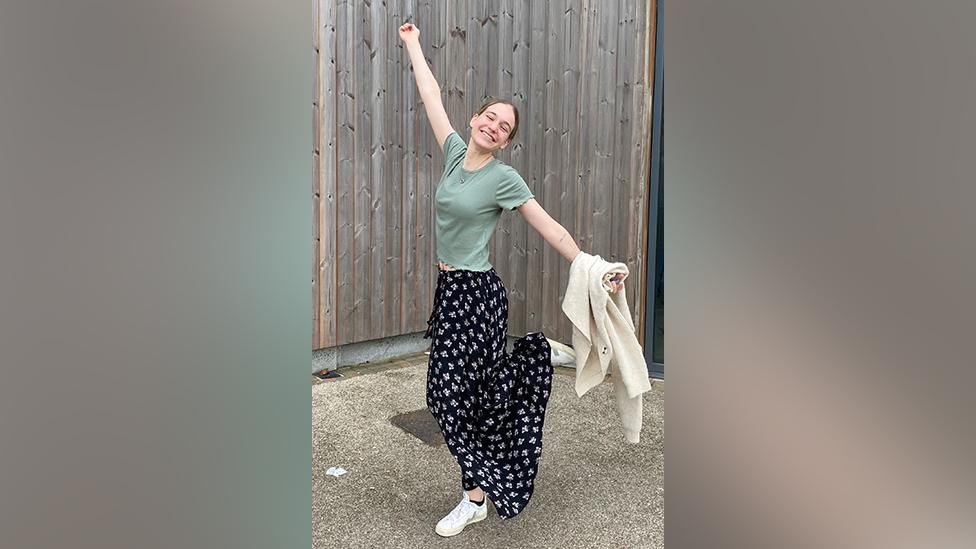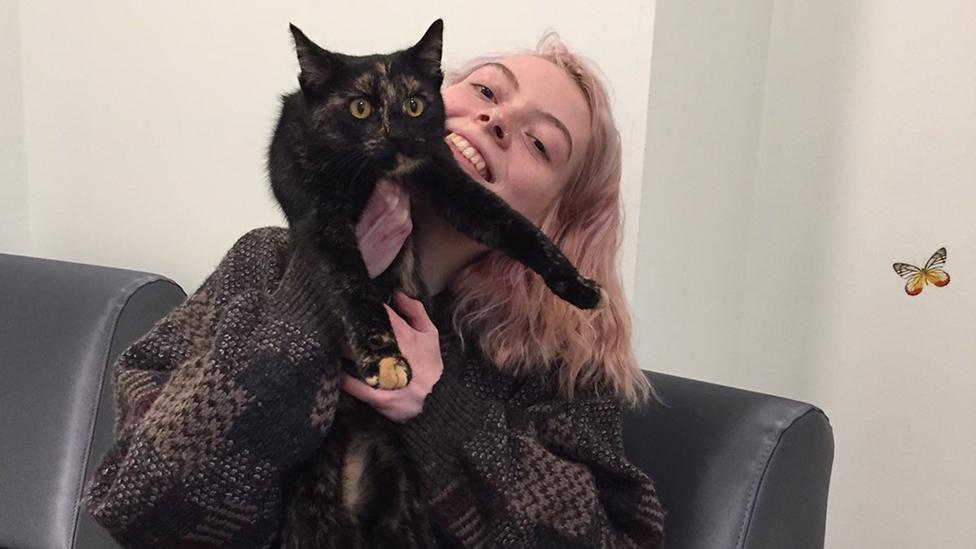NHS psych ward period provision criticised by patients
- Published

Lara says she's had some humiliating experiences on hospital wards
Imagine being on your period and "forced to beg for pads and tampons".
According to 24-year-old Lara, that's common for her and others on mental health hospital wards in the UK.
Lara is 18 months into a hospital admission and says she's experienced inadequate access to products, a lack of sanitary bins and being watched as she changed a tampon.
When she posted about her experience online, people from across the country responded with their own similar stories.
Mental health hospitals have various rules in place for safety reasons.
These can include limited access to certain items, restrictions on patients leaving wards and lists of what visitors can bring in.
NHS guidance states that period products should be available to anyone who needs them.
Lara says this hasn't always been the case for her.
"I've had a number of hospital admissions to psychiatric units and on one of my first they confiscated my period products," she says.
Lara says she has heavy periods, and when she needed to replace a tampon after two hours staff wouldn't give her another one.
She describes that as "humiliating".
Lara's currently on one-to-one observations for her own safety, which means someone has to escort her to the toilet and watch her change a pad or tampon.
But she says her worst experience was when she's had to wear anti-ligature clothing - again for safety reasons.
"I was forced to remove my pants and sanitary pad - which meant I just had to bleed into the clothing," she says.
"I understand the need for safety to come first, but this experience was unhygienic, traumatising and embarrassing for people to see."
Feeling 'ashamed'
Eleanor is 20 years old and recently spent time in a mental health hospital.
At her "most unwell", she says she didn't have access to her own clothing and had to wear the same special clothing Lara spoke about.
"When I was on my period I didn't have a choice but to wear adult nappies," she says.
"I'd have two or three people watching me changing and even though I know it's for my own safety, it's dehumanising," she says.
Eleanor says that experience, along with limited access to period products, left her feeling "lonely, ashamed and embarrassed".

Eleanor, pictured after being discharged from hospital, says limited access to period products on wards has negatively affected her
'It's just not thought about'
Twenty-five-year-old Hat has also spent time in different psychiatric wards, and has had mixed experiences.
"On one ward they'd lock away pads so you didn't have access without asking," Hat says.
"I was so unwell I wasn't able to do that and so I'd just use scrunched-up toilet roll in my pants.
"When you're mentally unwell it impacts your experience of having periods as well. Frankly the last thing on your mind is managing when to change a pad."
Hat, who uses gender-neutral pronouns, started their own research into other patient's experiences of periods on psychiatric wards.
It's being supported by the National Survivor User Network - which helps people who've experienced mental health illness and trauma.
So far Hat's interviewed patients and staff from across the country and says, while experiences completely vary, adequate period provision is often over looked.
"It's just something that isn't always thought about, or that people have different needs," says Hat
"Sometimes hospitals think it's easier just to have the same restrictions for everyone.
"Restrictions should be assessed on an individual basis and dignity taken into consideration - and too often people's period needs are forgotten about."
Hat hopes to produce some guidance for hospitals and staff, based on positive experiences and best practices, so that people have the products they need.

Hat has been conducting research into people's experiences on mental health wards
Newsbeat asked a number of unions, organisations and charities to comment on the experiences described but none wanted to provide one.
But one mental health professional, Kasper, did agree to discuss it.
Kasper agrees that safety is always a top priority but adequate period provision is often overlooked."I'm sure all trusts have a policy, but don't think it's always applied - and my observation is that it very much depends on what staff are on shift, especially when there can be lots of agency workers," Kasper says."We do keep products on my ward, but there's not much of a range.
"Patients can't access them and some staff don't know where they are either - so the onus is very much on patients, which can be tricky when they're unwell."
Kasper thinks there has to be a better way forward and believes access to period products for those in hospital should be viewed as a "basic human right".
'Worry at a stressful time'
Lara, Eleanor and Hat - whose surnames BBC Newsbeat has chosen not to use - all come under NHS England, which announced in 2019 that period products would be available to all patients who need them.
Shortly after, the NHS in Wales announced the same, with Scotland and Northern Ireland also doing this from 2022.
An NHS England spokesperson said it expects "all hospitals to give patients access to the essentials of daily life, including sanitary products, which is why we mandated it in their contracts in 2019".
"All patients should be able to request pads and tampons and not face additional stress and worry during what is already a stressful time."
NHS England did not provide a response to Hat, Eleanor and Lara's complaints about anti-ligature clothing and the availability of products.
Lara agrees, and thinks there are two areas that really need improvement - access to suitable products for patients, and also education for staff.
She's also recently had some success at the hospital she's in, which didn't have any sanitary bins for safety reasons.
"After months of campaigning we've finally got a cardboard sanitary bin in one of the bathrooms," she says.
"I hope this shows there's no excuse for poor and undignified sanitation on psych wards and others follow suit".

